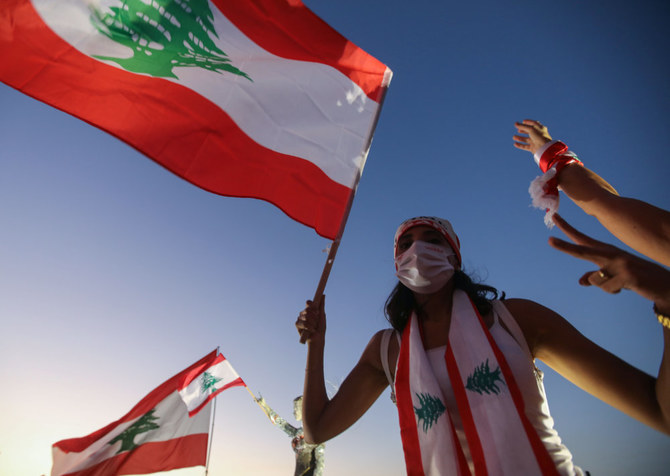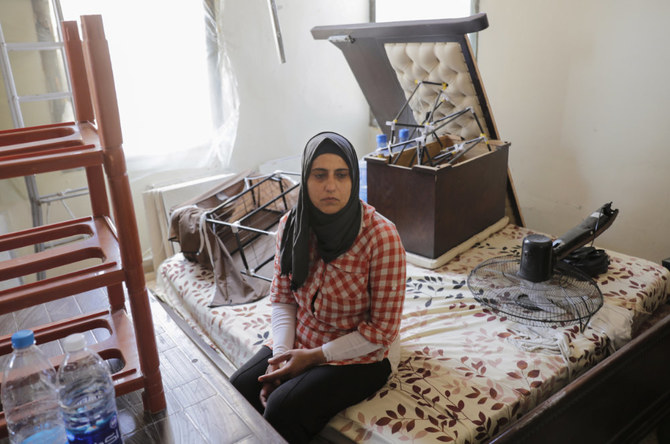BEIRUT: Almost half a century since Lebanon became embroiled in civil war, bullet-scarred buildings stand throughout Beirut as reminders of the city’s darker times alongside glistening towers signifying hope and renewal. And yet, like some great historical leveling, the port blast of Aug. 4 has indiscriminately left its scars on the city’s skyline, paying little heed to a building’s age or appearance.
The situation at ground level is scarcely any different. Beirut’s battered streets are a veritable metaphor for the emotional wounds of its people as they pick over the ruins of their economy, enduring constant power cuts and a new wave of coronavirus infections. The government is widely seen as ineffective and apathetic to demands for change.
“The physical wounds heal but the emotional ones take much longer to heal — I am not sure how we will ever get over what happened without justice,” said Ibana Carapiperis, 24, a volunteer with the Lebanese Red Cross, recalling the summer’s day when nearly 3,000 tons of improperly stored ammonium nitrate caught fire. The resulting blast killed 204 and left around 6,500 injured. Public outcry forced the government of Hassan Diab to resign.
“My emotions are still very hard to process from that day. Every time I try and understand my emotions, I feel like I could break at any minute. The blast is still so fresh after three months. It feels like it was yesterday,” Carapiperis added.
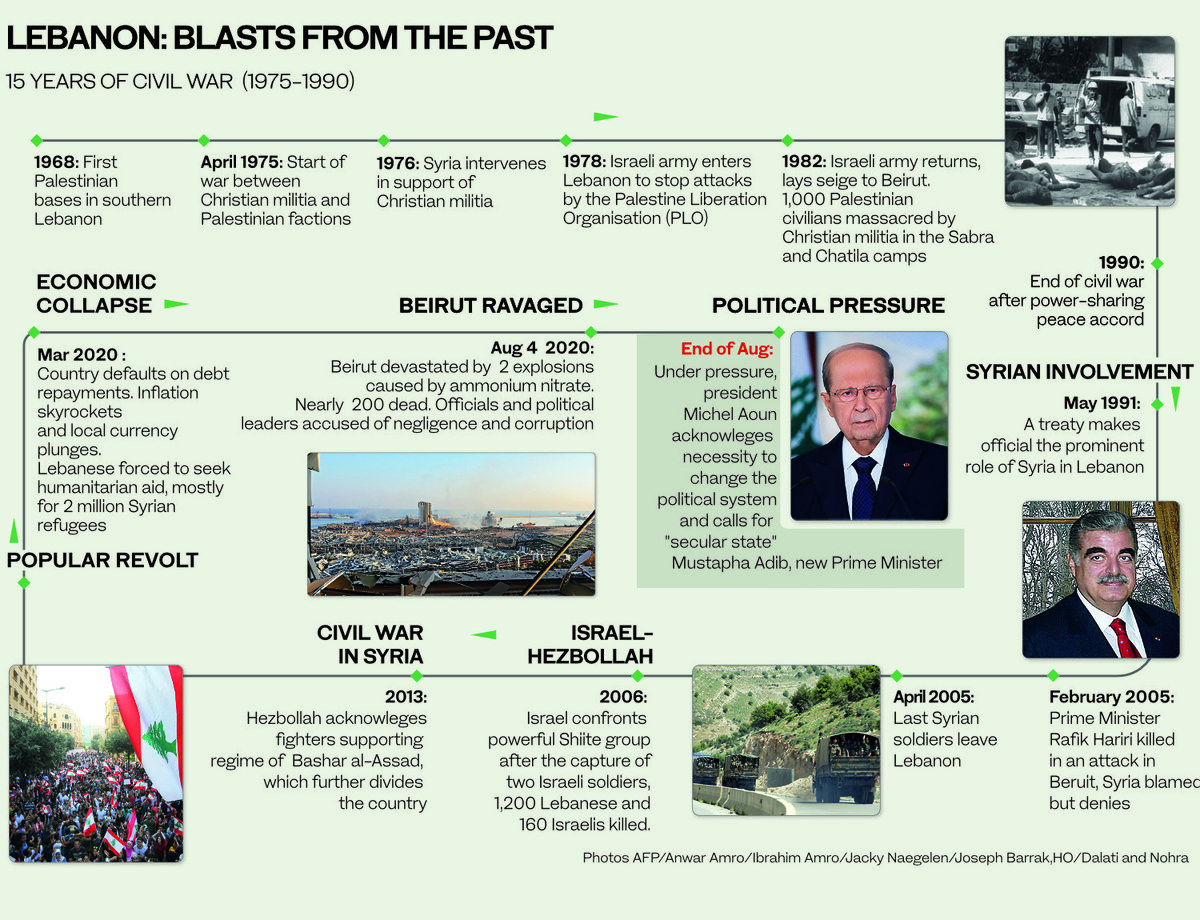
Oct. 17 marked one year since the “thawra” — or “revolution” in Arabic — when thousands of Lebanese took to the streets to demand political and economic change, forcing Prime Minister Saad Hariri to stand down. Yet the mood was different when they returned this year — dimmed by months of grinding hardship and defeat.
Many thawra hard-liners did not even attend. “What thawra?” asked one.
“We need unity, we need a leader. We are lost now,” said another.
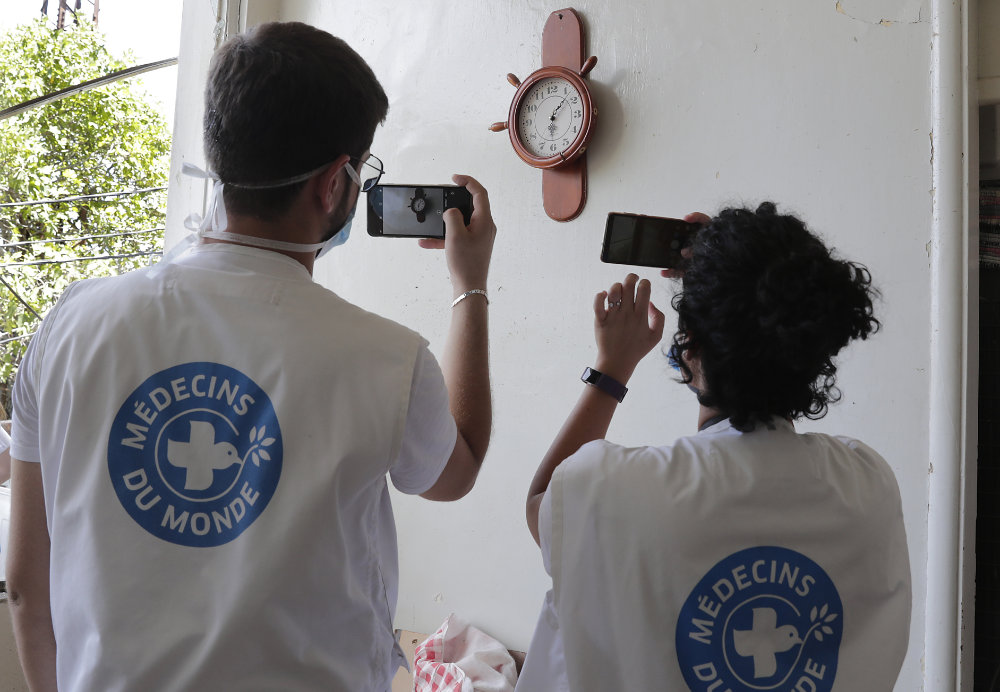
Volunteers of Medecins du Monde's (MDM) mental health program take a picture on August 11, 2020 of the clock that stopped due to the August 4 blast (18:08) in one of the damaged houses of the Lebanese capital's Karantina district. (Photo by ANWAR AMRO / AFP)
And just a few days after the revolution’s commemoration, when Mustapha Adib failed to win support for his non-partisan cabinet, Lebanon’s political class chose to return Hariri to office — compounding the revolutionaries’ sense of powerlessness. On Oct. 21, purported Hariri supporters even set fire to the “Revolution Fist” sculpture in Martyrs’ Square. It was quickly replaced the following morning by activists who refused to give up.
“What gives me hope is to know that people are still fighting every day, going to the streets to continue the revolution to try and change the system,” said Carapiperis. “This is not something we can just get over in a few days, weeks or months.”
Her diagnosis is corroborated by colleagues. “Not all wounds are visible, whether to a body or a beloved city,” said Marco Baldan, a Red Cross surgeon who helped coordinate the emergency response, in a statement. “On top of the horrific physical injuries that are being treated in hospitals, people risk developing huge, hidden scars unless they are supported through the psychological consequences of this catastrophe. Mental health support is a vital part of the medical response.”
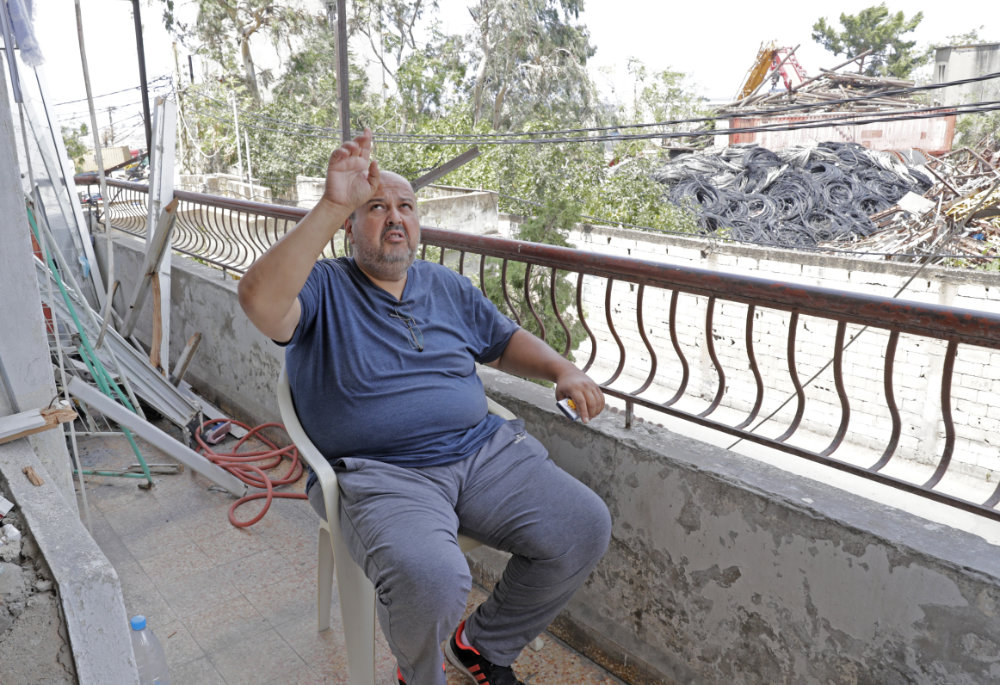
Talal Merhi, a resident of the badly-affected Karantina neighborhood of the Lebanese capital, speaks to the director of Medecins du Monde's (MDM) mental health program on August 11, 2020 at his damaged home. (Photo by ANWAR AMRO / AFP)
The explosion occurred when Lebanon was already in a state of hopelessness, following months in the grip of the COVID-19 outbreak and economic turmoil. People had lost jobs, businesses and savings; the situation contributed to a rise in depression, suicidal thoughts and despair among the population.
“People are mentally not okay,” Rona Halabi, a Red Cross spokesperson in Beirut, told Arab News. “There were at least 300,000 people who lost their homes so you can only imagine the stress that this has caused. We believe mental health is as important as physical health.
“After being injured physically, wounds will start to heal eventually, but what you will remember of this terrible incident will never go away. People need to learn tools to cope with the trauma and move on with their lives.”
Mental health workers say survivors are still far from okay — made worse by the loneliness of coronavirus restrictions.
“Once the pandemic started, anti-coronavirus measures like lockdown and curfew hit people’s traditional coping mechanisms, such as gathering socially and seeing friends, sharing their worries and frustrations,” said Isabel Rivera Marmolejo, the mental health delegate for the Red Cross in Lebanon. “Now, the explosion is one more crushing blow.”
LEBANON IN NUMBERS
At 155%, Lebanon’s debt-GDP ratio is the world’s third highest.
Public debt projected to touch 167% in 2021.
Inflation was expected to average 20% in 2020.
A special hotline was established after the blast to help people dealing with trauma in place of face-to-face counselling. However, even Lebanese psychologists who experienced the blast say they have been affected.
“Lebanese psychologists are also struggling with the trauma,” Myrna Gannage, psychology department director at Beirut’s Saint Joseph University, told Arab News.
She suffered non-life threatening injuries in the blast, but remains troubled by her experience. “I never in my life saw anything like this,” she said. “We as Lebanese have lost our sense of mental equilibrium. We are still lost. There is a lack of hope and a constant fear of uncertainty in the Lebanese people.”
Gannage added: “The Beirut explosions reactivated psychological wounds from the civil war. We are very fragile right now.”
So, how do you help people who have lost hope? “We must guide them to use their own individualistic resources,” said Gannage. “Lebanese society does not offer anything for the people — people are left to rely on their own means of survival. It is not easy to help people today. As psychologists we can listen to people as much as possible, but even we don’t have the same hope that we once did.”
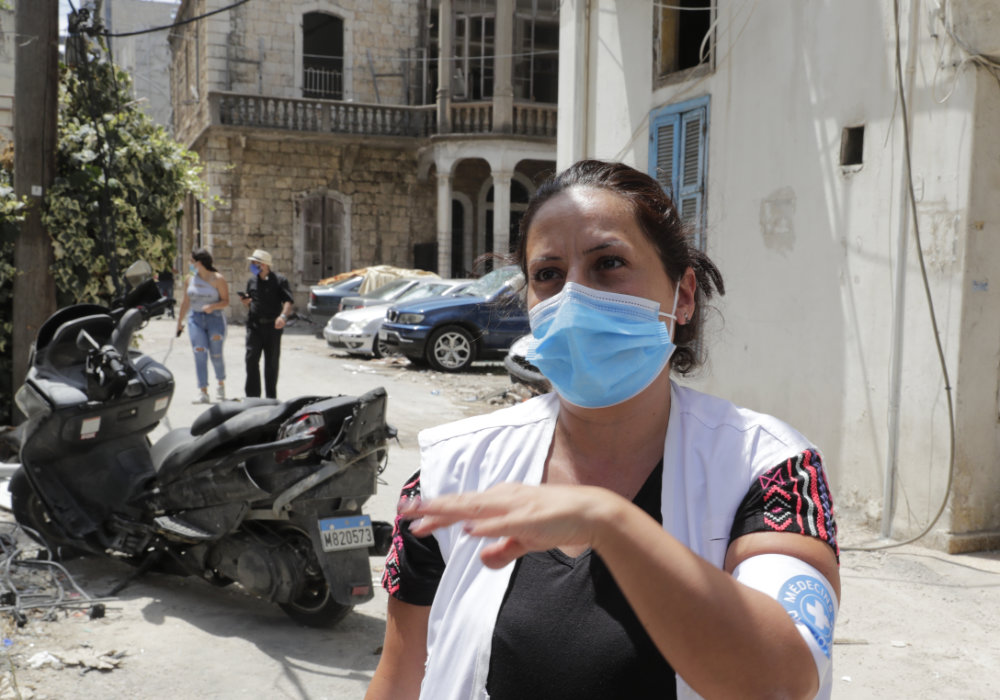
Noelle Jouane, director of Medecins du Monde's (MDM) mental health program in Beirut is pictured in the field in the Lebanese capital's Karantina district on August 11, 2020. (Photo by ANWAR AMRO / AFP)
Largely forced to fend for themselves, many Beirut residents simply need time to come to terms with what has happened and to find healthy ways to keep their minds occupied.
“I encouraged people to keep moving and to stick to routines and not to expect high levels of productivity from themselves,” said Gisele Chaine, a Lebanese psychologist with the Red Cross.
“People needed to go back slowly to everyday life. The people I am still speaking with over the phone are having less symptoms linked to trauma now, such as nightmares, lack of productivity and low concentration.”
It often depends on the level of individual resilience. “Sometimes, all they needed was someone to talk to. They needed to have a safe space over the phone,” Chaine said.
Perhaps a glimmer of hope lies in the numerous non-governmental organizations and support groups that were established in the wake of the blast. Many Lebanese, it seems, are finding a sense of purpose in helping to rebuild their community, even in the absence of government support. But then again, many others are choosing to leave the country to escape the trauma and the deepening economic malaise.
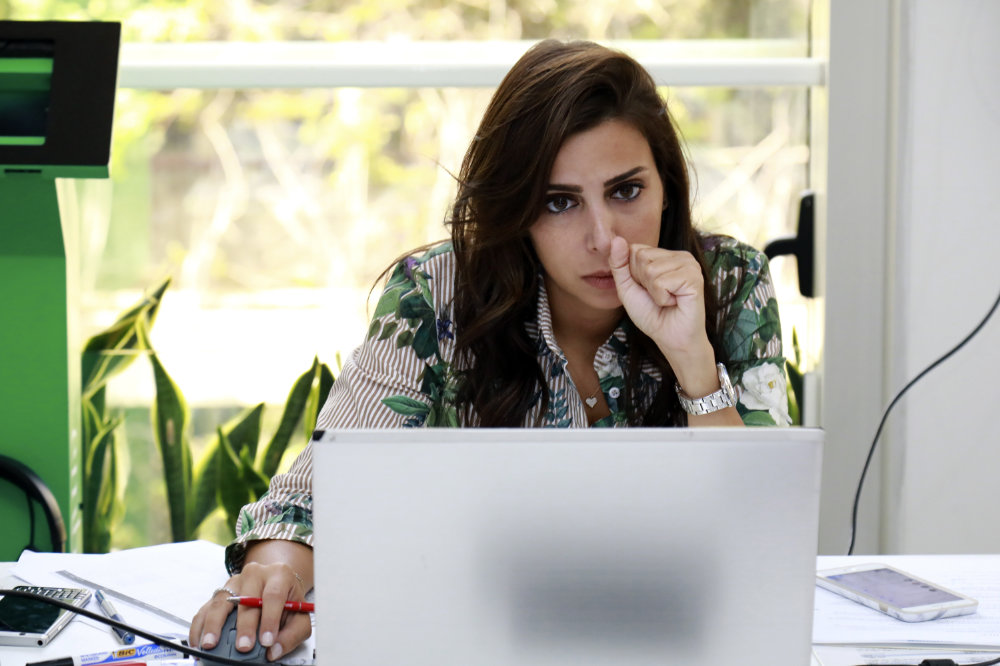
Clinical psychologist Mia Atwi, co-founder of Embrace, a suicide prevention helpline, reads emails in the Lebanese capital Beirut on July 13, 2018. (Photo by Anwar AMRO / AFP)
“Some families are still in the mountains and haven’t yet been able to go back to their houses in Beirut for fear of being in their damaged homes and being close to the site of the explosion,” said Mia Atwi, a clinical psychologist and co-founder of Embrace, a suicide prevention helpline launched in 2013.
“There’s a lot of hopelessness, there’s a lot of despair. There are many people who have been working on leaving Lebanon. On the phone you hear people that are anxious, depressed, hopeless and feeling unsafe and feeling very confused.”
For many Lebanese, closure will only be found once some kind of justice and accountability is achieved.
“Part of the healing process for most of us is to have social justice,” said Atwi. “This is not an event you can heal from using only trauma therapy. The explosions were a political event as well. They are the result of the incompetence of the government that we are living under. We need to know who was responsible for this and hold them accountable.”
__________________________________________________________________
• Twitter: @rebeccaaproctor



